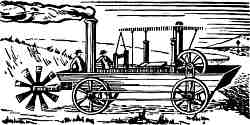 However, just 140 years before the people of Philadelphia had gathered
along the same street and river to witness a demonstration of inventor
Oliver Evans' strange vehicle
which he called the Orukter
Amphibolos or
Amphibious Digger. Here is his own description of the event. "To show
that both steam carriages and steamboats were practicable, I first
put wheels to the boat and propelled it by the engine a mile and a half
up Market Street and around Center Square to the River Schuylkill. I
then fixed a paddle-wheel at the stern and propelled it by the engine
down the Schuylkill and up the Delaware sixteen miles leaving all
the vessels that were under sail full halfway behind me."
However, just 140 years before the people of Philadelphia had gathered
along the same street and river to witness a demonstration of inventor
Oliver Evans' strange vehicle
which he called the Orukter
Amphibolos or
Amphibious Digger. Here is his own description of the event. "To show
that both steam carriages and steamboats were practicable, I first
put wheels to the boat and propelled it by the engine a mile and a half
up Market Street and around Center Square to the River Schuylkill. I
then fixed a paddle-wheel at the stern and propelled it by the engine
down the Schuylkill and up the Delaware sixteen miles leaving all
the vessels that were under sail full halfway behind me."This was not only a demonstration of the first "Duck" but also an exhibition of the first self-propelled vehicle to be built in this country preceding both the locomotive and steamboat by many years. It sometimes happens that men live in an age that has neither the market or production equipment to take advantage of their advanced ideas. Only after the motor boat and the automotive truck had been highly developed did the amphibious vehicle become a practical mechanism. Oliver Evans was one of those unusual persons who at an early age exhibited an exceptional skill and interest in things mechanical. At the age of 22 he developed a machine for making wire teeth used in carding wool. He also invented an automatic flour mill which processed the flour from the grain to the barrel without its being touched by human hands. |








